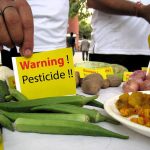Food Safety in the Time of COVID-19: Hand Washing
The coronavirus that causes COVID-19 is a respiratory virus. While the Centers for Disease Control does not consider COVID-19 to be a foodborne illness, there are actions that you can take to prevent foodborne illness that appear effective in fighting the coronavirus. Of the food safety steps in helping to mitigate coronavirus, hand washing appears to be the most important. Avoiding contact with […]
Read More...






